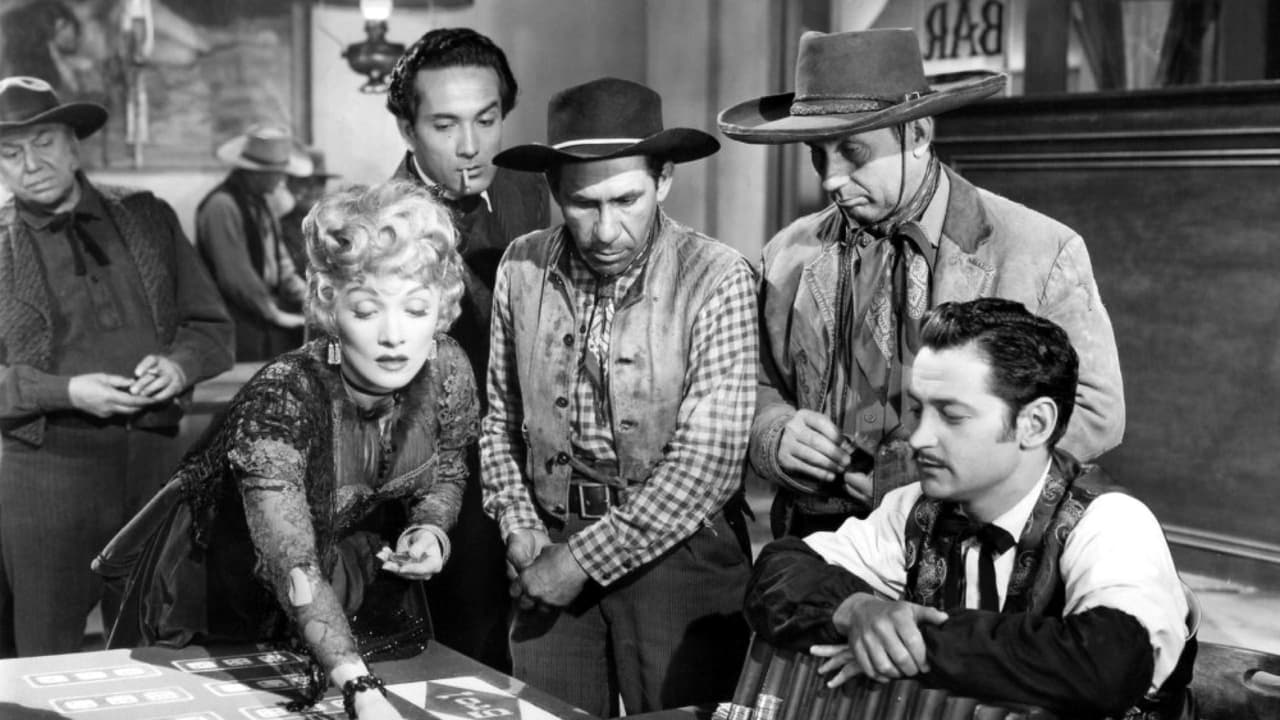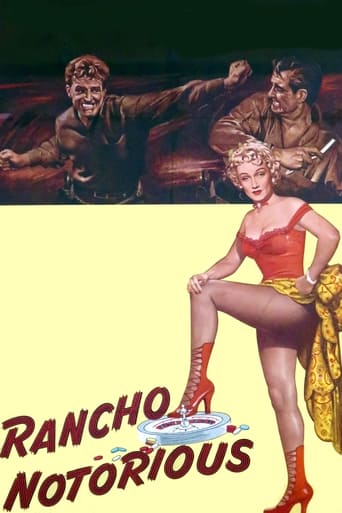

Nicely done Western with a very interesting story-line. I like the way it unfolds and how we follow the main character as he ups his game and his skills. This is the first time I have seen this approach to a western i.e. a detective type build-up that captures the viewer and holds them. I also like the Ranch that appears in the story. Beautiful with surrounding mountains, plenty of space and secluded. We have good guys, bad guys, bank robbers, love interests, saloons, lots of whiskey drinking, shootings, horses and even some flashback too. I am a Arthur Kennedy fan and he is one of the most under-rated actors out there. He always delivers a quality performance making you believe he is the character no problem. His Invasion of the Body Snatchers did it for me and of course he has done fine Westerns, dramas and all the rest. Good supporting cast. On Marlene Dietrich, anyone could have played the role she played and I wasn't thrilled to see her act it out but she does. Good movie to eat a burrito or steak sandwich plus a tasty drink. Mount-up all you pards and lets ride on this one.
... View MoreAn excellent Western, tense, powerful and moving. There is an air of tragedy and regret pervading the atmosphere, which makes it all the more highly charged. It also contains a number of fine set-pieces.Of the cast, Mel Ferrer is very good indeed as the stylish, charming gentleman-gunman, and Arthur Kennedy gives his usual fine performance (full of fevered intensity) as the hero.The film is often underrated (one of the leading film books in the UK, Halliwell's Film Guide, gives it no stars at all) which is why I have left this comment. It is a first rate, highly enjoyable Western, and thoroughly recommended.
... View MoreThe interesting thing about Fritz Lang's western "Rancho Notorious" (1952) is that it is very interesting. Mostly that is style over substance because the story is rather routine and the cast is nothing to write home about. Yet somehow the way Lang tells the story transforms this film into something very special. Flashbacks were nothing new, even in 1952, but Lang uses them very efficiently at several points in the film to provide a nice bit of background and character development. Lang sets up the story with a goodbye scene between Beth Forbes (Gloria Henry or Mrs. Mitchell to "Dennis the Menace" fans) and her fiancé, cowboy Vern Haskell (Arthur Kennedy), who gives her a jewel-studded brooch on his way out of town. The story is told from Vern's point-of- view, so when later that day Beth is raped and killed in her fathers assay office, Lang has the violence occur off camera, showing only accomplice Whitey waiting outside the office. The murderer is shown very briefly and his identity remains almost as unclear to the viewer as it is to Vern. The film is about Vern's efforts to track down a man who he cannot identify. This is what gives the film a complexity (to the first-time viewer) that is far greater than the standard "avenge your sweetheart's murder" story. Not unlike "High Noon", where the Frank Miller character provides all the motivational elements but is not actually seen until the last few minutes of the film. Lang understood how to structure a film and uses the language of film to play with his audience. Vern continues alone after the town's posse turns back (insert "The Searchers" here) at the Wyoming border. Meanwhile the two outlaws have a falling out and the murderer shoots Whitey and leaves him for dead. Still being told from Vern's POV, Lang cuts ahead to Vern catching up with the dying Whitey who mutters "chuck-a-luck" when asked where his murderer is heading. Chuck-a- luck, the alternative title of the film, is a gambling wheel (sometimes a dice game) found in western saloons. It gives Vern very little to go on but in a town near the Mexican border he is able to link it to a legendary woman named Altar Keane (Marlene Dietrich). Altar runs a "hole-in-the-wall" type outlaw sanctuary and Vern gains admission by helping her boyfriend Frenchy Fairmont (Mel Ferrer) break out of jail. There is immediate chemistry between Vern and Altar. She explains to him her rancho's "no questions" rule and introduces him to a group of outlaws who use the place as a base of operations, kicking back a percentage of their loot to Altar. A couple days later Vern knows that he is in the right place when Altar puts on Beth's brooch. The remainder of the film concerns Vern's attempts to deduce which of the resident outlaws is Beth's murderer. Throughout the film, voice-over commentary is provided by a Frankie Lane style ballad, which would be nicely satirized by Nat King Cole in "Cat Ballou". The film also inspired a parody of Dietrich in "Blazing Saddles". Then again, what do I know? I'm only a child.
... View MoreNot since JOHNNY GUITAR became a cult classic, has there been an odder western than RANCHO NOTORIOUS with its studio-bound outdoor sets filmed in muted Technicolor and such oddities as: 1) MEL FERRER, who looks cast against type as a fast gunslinger; 2) FRITZ LANG of film noir fame as the director of a mechanical western; 3) MARLENE DIETRICH fatally attracted to ARTHUR KENNEDY, with whom she shares no chemistry whatsoever; 4) GEORGE ("Superman") REEVES looking a bit flabby in a thin bad guy supporting role; 5) A clichéd, banal theme song to establish the "love, hate, revenge" motif of the story; 6) The central role of a tough outlaw (MARLENE DIETRICH) giving rise to comparisons with another cult favorite oddity, JOHNNY GUITAR and Miss JOAN CRAWFORD.To Dietrich's credit, when out of her western garb and gowned in jewels and gown, she looks stunning. But most of the time the close-ups are less than flattering and only emphasize the modern make-up and hairstyle that doesn't exactly smack of the Old West. It's a bit jarring, to say the least.Most of the performances are standard for this genre, but ARTHUR KENNEDY stands out like a sore thumb as the biggest miscasting mistake in the film, aside from MEL FERRER. Kennedy's tough guy seems like a pose left over from so many other of his petulant performances and this time there's absolutely nothing visible in his chemistry with Dietrich. No sparks despite all of his tempestuous outbreaks.Summing up: A trifle that can easily be overlooked in the resume of Fritz Lang.
... View More